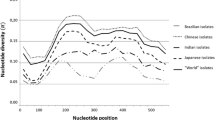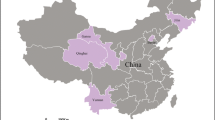Abstract
The CP gene variability among 21 olive latent virus 1 (OLV-1) isolates obtained from different hosts and locations and at different times was assessed. Amplicons obtained by RT-PCR were cloned, and at least 10 sequences from each isolate were analyzed and compared. OLV-1 sequences available in GenBank were included. The encoded CPs consisted of 270 amino acids, except those of isolates G1S and C7 (269 aa) and G6 (271 aa). Comparison of CP genomic sequences of the isolates under study showed very low values of nucleotide diversity, 0.02, and maximum nucleotide distances between (0.087) or within isolates (0.001). Although very few nucleotide sequence differences were observed among the isolates, olive isolates exhibited lower diversity (0.012). In addition, at position 158 (157 in C7 and G1S and 159 in G6) of the deduced aa sequences, an alanine residue was found to be conserved among the olive isolates. In citrus and tulip isolates, a threonine residue was present at position 158, whereas a valine was present at this same position in tomato isolates. Phylogenetic analysis indicated that OLV-1 isolates clustered in five groups according to original host. However, G6, originally recovered from olive but repeatedly inoculated and maintained in N. benthamiana plants for 8 years in our laboratory, was separated from other isolates. This may be attributable to adaptation to the experimental host over time. There was no correlation of phylogenetic grouping of isolates based on geographical location or year of collection. Strong negative selection may have contributed to the low diversity among the OLV-1 CP isolates.


Similar content being viewed by others
References
Alabdullah A, Elbeaino T, Minafra A, Digiaro M, Martelli GP (2009) Detection and variability of olive latent virus 3 in the mediterranean region. J Plant Pathol 91(3):521–525
Borodynko N, Hasiów-Jaroszewska B, Pospieszny H (2010) Identification and characterization of an olive latent virus 1 isolate from a new host: Solanum lycopersicum. J. Plant Pathol 92(3):789–792
Canizares MC, Marcos JF, Pallás V (2001) Molecular variability of twenty-one geographically distinct isolates of Carnation mottle virus (CarMV) and phylogenetic relationships within the Tombusviridae family. Arch Virol 146:2039–2051
Cardoso JMS, Félix MR, Clara MIE, Oliveira S (2005) The complete genome sequence of a new necrovirus isolated from Olea europaea L. Arch Virol 150:815–823
Chare ER, Holmes EC (2004) Selection pressure in the capsid genes of plant RNA viruses reflect mode of transmission. J Gen Virol 85:3149–3157
Coutts RH, Rigden JE, Slabas AR, Lomonossoff GP, Wise PJ (1991) The complete nucleotide sequence of tobacco necrosis virus strain D. J Gen Virol 72:1521–1529
El Air M, Mahfoudi N, Digiaro M, Najjar A, Elbeaino T (2011) Detection of olive-infecting viruses in Tunisia. J Phytopathol 159(4):283–286
Fadel C, Digiaro M, Choueiri E, El Beaino T, Saponari M, Savino V, Martelli GP (2005) On the presence and distribution of olive viruses in Lebanon. Bul OEPP/EPPO 35:33–36
Félix MR, Clara MIE (1998) Características biológicas e bioquimicas da estirpe G1, do Necrovirus Olive laten 1 isolado de Olea europaea L. Actas da 2ª Reunião Bienal da Soc Port de Fitopatol 67
Félix MR, Varanda CMR, Cardoso JMS, Clara MIE (2004). Soil transmission of an olive isolate of olive latent virus 1. In: 15th International Plant Protection Congress, Beijing, China, Book of Abstracts p 447
Félix MR, Cardoso JMS, Varanda CMR, Oliveira S, Clara MIE (2005) Complete nucleotide sequence of an olive latent virus 1 isolate from olive trees. Arch Virol 150:2403–2406
Félix MR, Varanda CMR, Cardoso JMS, Clara MIE (2006) Plant root uptake of olive latent virus 1 and olive mild mosaic virus in single and mixed infections. In: Proceedings of the 12th Congress of the Mediterranean Phytopathological Union, Greece, 516–517
Félix MR, Cardoso JMS, Oliveira S, Clara MI (2007) Biological and molecular characterization of olive latent virus 1. Plant Viruses 1:170–177
Fraile A, Malpica JM, Aranda MA, Rodriguez-Cerezo E, Garcia-Arenal F (1996) Genetic diversity in tobacco mild green mosaic tobamovirus infecting the wild plant Nicotiana glauca. Virology 223(1):148–155
Gallitelli D, Savino V (1985) Olive latent virus 1, an isometric virus with a single RNA species isolated from olive in Apulia, Southern Italy. Annu Appl Biol 106:295–303
Garcia-Arenal F, Fraile A, Malpica JM (2001) Variability and genetic structure of plant virus populations. Annu Rev Phytopathol 39:157–186
Grieco F, Savino V, Martelli GP (1996) Nucleotide sequence of the genome of a citrus isolate of olive latent virus 1. Arch Virol 141:825–838
Hall TA (1999) BioEdit: a user-friendly biological sequence alignment editor and analysis program for Windows 95/98/NT. Nucl Acids Symp Ser 41:95–98
Hasiów-Jaroszewska B, Borodynko N, Pospieszny H (2011) Molecular characterization of the full-length genome of olive latent virus 1 isolated from tomato. J Appl Genet 52(2):245–247
Kanematsu S, Taga Y, Morikawa T (2001) Isolation of olive latent virus 1 from tulip in Toyama prefecture. J Gen Plant Pathol 67:333–334
Kosakovsky Pond SL, Frost SDW (2005) Not so different after all: a comparison of methods for detecting amino acid sites under selection. Mol Biol Evol 22(5):1208–1222
Liang XZ, Lee BTK, Wong SM (2002) Covariation in the capsid protein of Hibiscus chlorotic ringspot virus induced by serial passing in a host that restricts movement leads to avirulence in its systemic host. J Virol 76:12320–12324
Lin HX, Rubio L, Smythe A, Jiminez M, Falk B (2003) Genetic diversity and biological variation among California isolates of Cucumber mosaic virus. J Gen Virol 84:249–258
Lobão DL, Félix MR, Clara MIE, Oliveira S, Leitão FA, Serrano JF (2002) Detection of Olive latent virus 1 in Olea europaea L. tissues by reverse transcription-polymerase chain reaction. XIII Congresso Nacional de Bioquimíca, p 102
Martelli GP, Sabanadzovic S, Savino V, Abu-Zurayk AR, Masannat M (1995) Virus-like disease and viruses of olive in Jordan. Phytopathol Mediterr 34:133–136
Martelli GP, Yilmaz MA, Savino V, Baloglu S, Grieco F, Güldür ME, Greco N, Lafortezza R (1996) Properties of a citrus isolate of olive latent virus 1, a new necrovirus. Eur J Plant Pathol 102:527–536
Merciega V, Boscia D, Savino V (1996) Comparison of five isolates of olive latent virus 1. Phytopathol Mediterr 35:1–8
Meulewaeter F, Seurinck J, Vanemmelo J (1990) Genome structure of Tobacco necrosis virus strain-A. Virology 177:699–709
Oda Y, Saeki K, Takahashi Y, Maeda T, Naitow H, Tsukihara T, Fukuyama K (2000) Crystal structure of tobacco necrosis virus at 2.25 Ǻ resolution. J Mol Biol 300:153–169
Pantaleo V, Grieco F, Di Franco A, Martelli GP (2006) The role of the C-terminal region of olive latent virus 1 coat protein in the host systemic infection. Arch Virol 151(10):1973–1983
Rico P, Ivars P, Elena SF, Hernández C (2006) Insights into the selective pressures restricting Pelargonium flower break virus genome variability: evidence for host adaptation. J Virol 80(16):8124–8132
Rodriguez-Cerezo E, Moya A, Garcia-Arenal F (1989) Variability and evolution of the plant RNA virus pepper mild mottle virus. J Virol 63(5):2198–2203
Roossinck MJ (1997) Mechanisms of plant virus evolution. Annu Rev Phytopathol 35:191–209
Rubio L, Ayllón MA, Kong P, Fernández A, Polek M, Guerri J, Moreno P, Falk BW (2001) Genetic variation of Citrus tristeza virus isolates from California and Spain: evidence for mixed infections and recombination. J Virol 75(17):8054–8062
Saponari M, Savino V, Martelli GP (2002) Transmissioni per seme dei virus dell’olivo. Frutticoltura 4:103–105
Savino V, Sabanadzovic S, Sacrito G, Laviola C, Martelli GP (1996) Due giallumi dell’ olivo di possible origine virale in Sicilia. Inf Fitopatol 5:55–59
Tamura K, Peterson D, Peterson N, Stecher G, Nei M, Kumar S (2011) Mega5: Molecular evolutionary genetics analysis using maximum likelihood, evolutionary distance, and maximum parsimony methods. Mol Biol Evol 28(10):2731–2739
Valverde RA, Nameth ST, Jordan RL (1990) Analysis of double stranded RNA for plant virus diagnosis. Plant Dis 74:255–258
Varanda CMR, Cardoso JMS, Félix MRF, Oliveira S, Clara MIE (2010) Multiplex RT-PCR for detection and identification of three necroviruses that infect olive trees. Eur J Plant Pathol 127:161–164
Vives MC, Rubio L, Galipienso L, Navarro L, Moreno P, Guerri J (2002) Low genetic variation between isolates of Citrus leaf blotch virus from different geographical origins. J Gen Virol 83:2587–2591
Woelk CH, Holmes EC (2002) Reduced positive selection in vector-borne RNA viruses. Mol Biol Evol 19(12):2333–2336
Youssef SA, Moawed SW, El-Sayed M, Shalaby AA, (2010) Detection of olive tree viruses in Egypt by one-step RT-PCR. In: 21st International Conference on virus and other graft transmissible diseases of fruit crops. Julius-Kuhn-Archiv, 427:51–55
Acknowledgments
The authors would like to thank to Sara Godena (Institute of Agriculture and Tourism Poreč, Croatia) and Natacha Borodynko (Institute of Plant Protection, Poznan, Poland) for supplying OLV-1 isolates used in this study. The authors are grateful to Mrs. Maria Mário Azedo for her technical assistance. Carla Marisa R. Varanda is recipient of a postdoctoral fellowship from Fundação para a Ciência e a Tecnologia (FCT), SFRH/BPD/76194/2011.
Author information
Authors and Affiliations
Corresponding author
Rights and permissions
About this article
Cite this article
Varanda, C.M.R., Nolasco, G., Clara, M.I. et al. Genetic diversity of the coat protein of olive latent virus 1 isolates. Arch Virol 159, 1351–1357 (2014). https://doi.org/10.1007/s00705-013-1953-7
Received:
Accepted:
Published:
Issue Date:
DOI: https://doi.org/10.1007/s00705-013-1953-7




